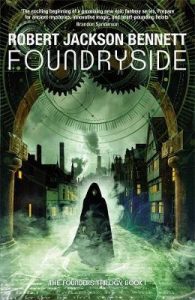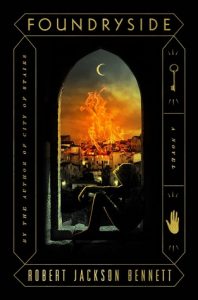Foundryside by Robert Jackson Bennett
 There were few books in 2018 that I could have looked forward to more than this one. The Divine Cities trilogy, rightly Hugo nominated, is one of my favourite series of all time. Those books quite simply blew me away, and when I heard Robert Jackson Bennett had a new series coming out, I couldn’t believe my luck in getting my hands on a copy ahead of release. However, I wasn’t convinced at first. In fact, about halfway through I was… disappointed.
There were few books in 2018 that I could have looked forward to more than this one. The Divine Cities trilogy, rightly Hugo nominated, is one of my favourite series of all time. Those books quite simply blew me away, and when I heard Robert Jackson Bennett had a new series coming out, I couldn’t believe my luck in getting my hands on a copy ahead of release. However, I wasn’t convinced at first. In fact, about halfway through I was… disappointed.
Thankfully, that feeling didn’t last.
Why was I disappointed? Mainly, and perhaps unfairly, because Foundryside is not Divine Cities. Anyone whose favourite band takes a new creative direction knows the uncertainty this can bring. However, it’s still the same band, and if you listen enough you often realize those musical sensibilities that you love about the band shine through – but it can take a while.
I fell in love with Divine Cities for the worldbuilding. Sure, those books have everything – thrilling action, suspenseful plot, memorable characters – but what sets them apart is the way the worldbuilding drives the story. In Divine Cities, the worldbuilding is the plot – the central mysteries in each book uncover a layer of how the divine works in that world. And I love a mystery.
In Foundryside, the plot is a heist (well, several), and the worldbuilding seems at first to be set dressing. Yes, scriving – the concept that runes can reprogram reality – is central to the plot, but the mysteries of the world are uncovered by accident and misadventure, not investigated directly. Perhaps, for me, this difference between a mystery/spy thriller and an action/heist caper was what threw me for a while. It’s been described as Epic Fantasy, and by the last page, it certainly is. (Confession: I don’t actually read a lot of Epic Fantasy anymore.)
There’s plenty of action – chases, fights, infiltrations, escapes, high-powered weapons, flying gizmos, that sort of thing. The roller-coaster barely lets you catch your breath, and character motivations sometimes seemed to get swept along in the forward momentum. Pretty soon a team comes together to thwart a big danger – a danger that keeps shifting and growing as they discover more. The plot twists and shifts but rarely shocks (if you’re paying attention, anyway). The social commentary is both buried a little deeper and much more obvious than in Divine Cities. There’s also a pretty clear distinction between good and bad, which, these days, can take a little getting used to.
And, of course, there’s the crazily complex and inventive magic system powering some neat technology. Scriving is pretty cool, I’ll give you that. However, it is really powerful. We barely get time to be introduced to the idea of it, and soon people are flying through the air, communicating remotely, and generally causing a lot of damage (sometimes to each other). Amazing things are enabled, but it’s hard to grasp the limits, and as a result there’s an occasional sense of convenience to the magic. It can do almost anything, it seems, so offers a neat solution to a lot of obstacles. Especially in the case of the elder magic…
Again, all of this was pushing me out of my comfort zone – and yet, I couldn’t stop reading. (If you are thinking at this point, “Is he crazy? Action, magic, stakes – sounds awesome!”, well, I do wonder sometimes myself. Go buy the book!)
 Perhaps another disappointment in the worldbuilding, for me, is that we are back on well-trodden ground. We are in a city much like a Renaissance Venice, ruled by merchant clans, with deadly slums surrounding their walled paradises. We’ve all been here before. Perhaps as a result, we don’t get much detail of the setting unless it has to do with the scriving or plot. The city seems a bit of an empty wasteland, peopled only when necessary – which makes sneaking around less suspenseful. The technology enabled also brings a lot of 20th century artefacts into our Renaissance setting, erasing and overwriting parts of it. Though often perfectly valid, these anachronisms make it feel fuzzy and indistinct at times. This blurry worldbuilding was, if I’m honest, occasionally present in Divine Cities, but here it bothered me a little more.
Perhaps another disappointment in the worldbuilding, for me, is that we are back on well-trodden ground. We are in a city much like a Renaissance Venice, ruled by merchant clans, with deadly slums surrounding their walled paradises. We’ve all been here before. Perhaps as a result, we don’t get much detail of the setting unless it has to do with the scriving or plot. The city seems a bit of an empty wasteland, peopled only when necessary – which makes sneaking around less suspenseful. The technology enabled also brings a lot of 20th century artefacts into our Renaissance setting, erasing and overwriting parts of it. Though often perfectly valid, these anachronisms make it feel fuzzy and indistinct at times. This blurry worldbuilding was, if I’m honest, occasionally present in Divine Cities, but here it bothered me a little more.
If I’m honest, the characters are a bit more clichéd here, too. We have the plucky (young?) thief with a gift, the naive noble constable, the scheming mad scientist, the bookish apprentice. All have some nice moments, but struggle to completely transcend their roles. There is one character that stands out as quite unique, and brings a lot of life to every page they are on – but I’ll let you discover them on your own.
And yet, I couldn’t stop reading. The mysteries deepened, the characters deepened, the villains emerged from the shadows, and the stakes got higher and higher. Powerful magic got trumped by even more powerful magic, and all our heroes (they do become heroes) are pushed to the limits. Really, it’s everything you could want from an Epic Fantasy.
In the end, even I was convinced. It may never displace Divine Cities in my affections, but it’s a damn good book – and one that should bring Robert Jackson Bennett to an even wider audience. Maybe this was the intention all along. Though still recognisably RJB, I could describe it as Sanderson* meets Pratchett, if you take the best of both (though not Sir Pterry’s humour, which isn’t to say it’s humourless, not by a long shot). That can’t be a bad thing.
Going back to music, a lot comes down to taste. Robert Jackson Bennett is still a brilliant musician**. However, if Divine Cities was prog rock, Foundryside is heavy metal.
This one goes up to eleven.
Whatever your taste, I strongly encourage you to read it.
* Sanderson’s cover quote is clearly no accident.
** I have no evidence that RJB is actually a musician of any sort.

[…] Jackson Bennett, and it might be helpful to familiarise myself with my review of the first book, Foundryside, for context – and to save myself repeating much of it. And if you want to avoid reading the […]
I love your musical analogy, prog rock vs. heavy metal ? Totally agree!